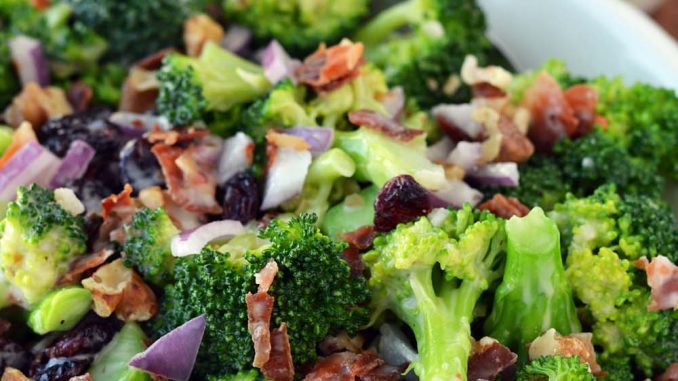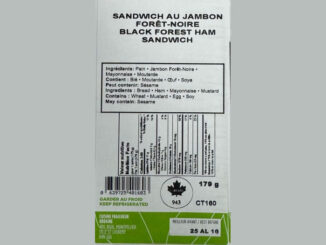
Driven by their insatiable hunger for variety and healthful ingredients and preparation, produce department shoppers are eager to sample deli salads—from long-time staples like potato salad, macaroni salad and coleslaw to a host of more exotic varieties.
Merchandised and promoted well, and with a careful eye on shelf life issues, it is a category that can easily be made a destination by savvy retailers.
Food companies today are offering a larger assortment of healthful and exciting deli salads than ever before. For example:
*Reser’s Fine Foods Inc. based in Beaverton, OR, produces a line that includes Southern Style Potato Salad With Egg, Stadium Cole Slaw, Bacon Ranch Pasta Salad, Deviled Egg Macaroni Salad and Garden Pasta Salad.
* Sandridge Food Corp. in Medina, OH, markets deli salad varieties like Chicken Salad with Almonds in Lemon Dressing, Chicken Salad with Pecans and Mermaid Salad.
*Sally Sherman Foods in Mount Vernon, NY, produces a line of so-called “Ancient Grain” salads such as Athens Farro, Harvest Wheatberry, Mango Cashew Basmati, Pesto Farro and Tricolor Garden Quinoa.*Simply Fresh Foods Inc.’s San Francisco Foods line includes Seafood Salad with real Snow Crab Meat, Quinoa Cranberry Grain Salad and Savory Seafood Salad.
Cleaner Labels
Consumers are moving towards healthier salad dressings and sauces, says Katie Mackie, marketing specialist for T. Marzetti Co. in Westerville, OH. Citing data from Datassential MenuTrends, she says 59 percent of consumers would be more likely to buy a sauce or salad dressing with a clean label.
“So, including clean-label items at your deli and salad bar is key,” Mackie adds. “Most consumers believe that clean-label dressings and sauces have no artificial flavors or colors, GMOs, artificial sweeteners, MSG or high-fructose corn syrup.”
Caesar is by far the most popular salad variety, Mackie reports. Other hot sellers include Greek, tuna, cobb and chef. Staple deli salads include cole slaw, potato salad, and fruit and pasta salad. Trending salad toppings include quinoa, pumpkin seeds and sunflower seeds. Sweet potatoes, Brussels sprouts and kale are also on trend, she adds.
“Traditional ethnic salad ingredients are trending,” she notes. “For example, ingredients such as poke, falafel, seaweed and edamame have all seen significant growth on menus.”
Mackie believes that salad bars and delis can effectively market and merchandise their wares by using branded products. “For example, a 32-ounce bottle with a logo will resonate with consumers more than a pan with dressing and a ladle.”
Jeffrey Siegel, CEO of Farm Ridge Foods, headquartered in West Palm Beach, FL, says he learned the industry from his family’s business, which had been one of the major producers of salads in the country between 1980 to 2000.
“We have witnessed a race to the bottom,” Siegel says. “Who can make the product the fastest and the cheapest? We have ended up with either mushy or hard potatoes in the potato salad and watered down macaroni salad and coleslaw—all tasting okay. The products are not terrible, but far from great.”
Siegel promises that he and his colleagues are “definitely going to be changing that dynamic. Good food sells good; great food sells great.” He says that “while innovation and new styles of foods are the lifeblood of any business, there will always be a place for comfort foods. I believe that potato salad, macaroni salad and slaw fit into these categories. People are clearly eating them less, often as they do not have a healthy halo on them, but they’re still very popular.”
When people are eating them, he adds, “I believe they want a wonderful eating experience. The salad products out there do not deliver that; they are way too focused on cost.”
While cost remains critical, Siegel points out, “so is building a business. I believe we’re going to see a sea of change in this arena. It has laid fallow for many years. We at Farm Ridge expect to revitalize this entire category.”

A Healthful Focus
Krystle Turnbull, brand manager at Litehouse, Inc., based in Lowell, MI, is continuing to see growing demand for healthier and better-for-you products with cleaner labels and streamlined ingredient panels, with a focus on non-GMO ingredients, healthier oil types, natural sugars and natural preservatives.
To address these needs, Litehouse recently reformulated its Pourable Vinaigrette Dressings, which are now made with less fat, sugar and calories. Its Organic Pourable Dressings were also recently reformulated and feature a new look, dairy-free formulation and better taste.
John Becker, senior director of marketing for Sandridge Food Corp. in Medina, OH, suggests that plant-forward options are gaining in popularity. “Grains and hearty vegetable salads are becoming more popular, especially under the glass.”
Consumers “now want transparency,” Becker notes. “It’s not just about clean, it’s about being honest about what ingredients are used in foods and letting them make educated choices.” Consumers, he adds, “are looking to food as functionality, whether looking to reduce added sugars, looking for alternate protein sources or managing calorie intake.” Beans and grilled vegetables are also growing in popularity, driven by perceptions of nutritional benefits.
Traditional Favorites
While American consumers will always love variety and newness, they unceasingly tend to come home to the traditional favorites, according to Becker. “Potato salads, macaroni and pasta salads, and coleslaw still show the highest volumes in customer portfolios,” he says.
Popular ethnic varieties, such as Italian, Mexican and Mediterranean, have wider appeal and are growing, Becker confirms. “But consumers seem to be more risk averse to less popular global flavors, such as Thai and Indian, at least in the fresh salad category. Folks may try a unique flavor for their family, but don’t want to alienate their guests at a gathering.”
Becker urges deli managers to keep retail offerings geared toward mass appeal, “but add ethnic or new flavor options behind the glass. Try pairing ethnic offers with other complementary deli products. Provide a meal menu theme, not just a single product.”
He and his colleagues have addressed many historic shelf-life challenges “utilizing our HPP technology,” Becker says. “We can offer several cleaner tasting—and labeled—products without need for preservatives or acidifiers, all with extended shelf life to better survive the refrigerated cold chain.”

International Flavors
Bold and spicy international flavors, such as those often found in Asian, Mexican and Mediterranean cuisines, continue to be popular among consumers.
“We offer a variety of products inspired by flavors from around the world, including our Sesame Ginger dressing, and fresh
flavor combinations with a touch of heat like Sriracha Lime dressing and our award-winning Mango Habañero dressing,” says Turnbull at Litehouse. “We also have several Mediterranean-inspired flavors that are perfect on salads or as
marinades for meat, fish and chicken, including our zesty Balsamic Vinaigrette and Italian dressings, our savory Red Wine Vinegar with Olive Oil dressing and our delicious Greek dressing.”
Carl H. Cappelli, senior vice president of sales and business development for Don’s Food Products in Schwenksville, PA, is finding that consumers look for more international flavors and clean salads. His company is meeting that need with its new Gourmet Sides & Artisan Deli line. They also want to stay healthy. “They seek clean products and globally-inspired flavors” and both grab-and-go and meal solution ideas, which he calls “key. Fresh, not frozen, also is important.”
Don’s Artisan Deli line of salads includes Classic Tuna, Italian Style Tuna, Seafood and White Meat Chicken.
Cappelli calls the staple salads “inexpensive belly stuffers. Those meet the needs of some consumer needs; younger consumers seek flavorful and fresh.” He identifies “grains, clean, grains, clean, grains” as the prevalent product trend. “They marry well with chicken and fish. Consumers want healthy and delicious meal solutions.” He and his fellow executives also see ethnic salads growing, especially “global flavors” such as Asian, African, Mediterranean and Latin.
Cappelli says he is a believer that delis can market and merchandise “meal solutions and clean items bursting with flavor and globally inspired.” Ordering and merchandising weekly can help assure product freshness. “Properly handle products and plan to sell items within five days after the re-pack.”

Meal Replacement
“We are seeing growth in the entrée side of the business or meal replacement,” says Moira Gavin, director of marketing and business development for Winter Gardens Quality Foods in New Oxford, PA. “There is a convergence of two trends
—less time to make a meal from scratch as well as a desire to have a healthy meal ready to grab and go.”
Gavin says she and her colleagues work closely with a full spectrum of customers in developing proprietary entrées. “We are seeing growth in this arena. What we are finding is a high level of involvement towards clean ingredients as well as innovative flavor profiles. Our salad staples are potato salad, coleslaw, macaroni salad and pasta salad.”
Although these sell consistently throughout the year, the peak time for them is the Memorial Day through Labor day period.
Winter Gardens has found that the trend is still strong with clean ingredients, which consumers are demanding. “We have had success with some of our partners with ethnic salads,” Gavin says, “but so far this is limited to certain geographical locations. Product evolution is inevitable, and innovation will lead the way.”
Presentation is key, Gavin suggests. “Setting a high standard for variety, making sure the cases are full and clean and colorful, which is easier said than done. The companies that are most successful set high standards and best practices to insure consistency.”
The company’s offerings include Amish Macaroni Salad, Amish Pepper Slaw, Cream Slaw Amish Style, Creamy Cole Slaw, Dutch Potato Salad, Potato Salad with Egg and Red Potato Salad.
“We, as a company, work very diligently on shelf life, doing rigorous testing all throughout the process,” says Gavin. “Each category has a different profile. As far as the deli managing the shelf life, that requires an essential understanding of rate of sale and seasonal impacts as well as trending items.”
Bottom line, Gavin concludes, maximizing sales of supermarket deli salads means “really staying close to the customer, while always reviewing and refining the product assortments.” DB



